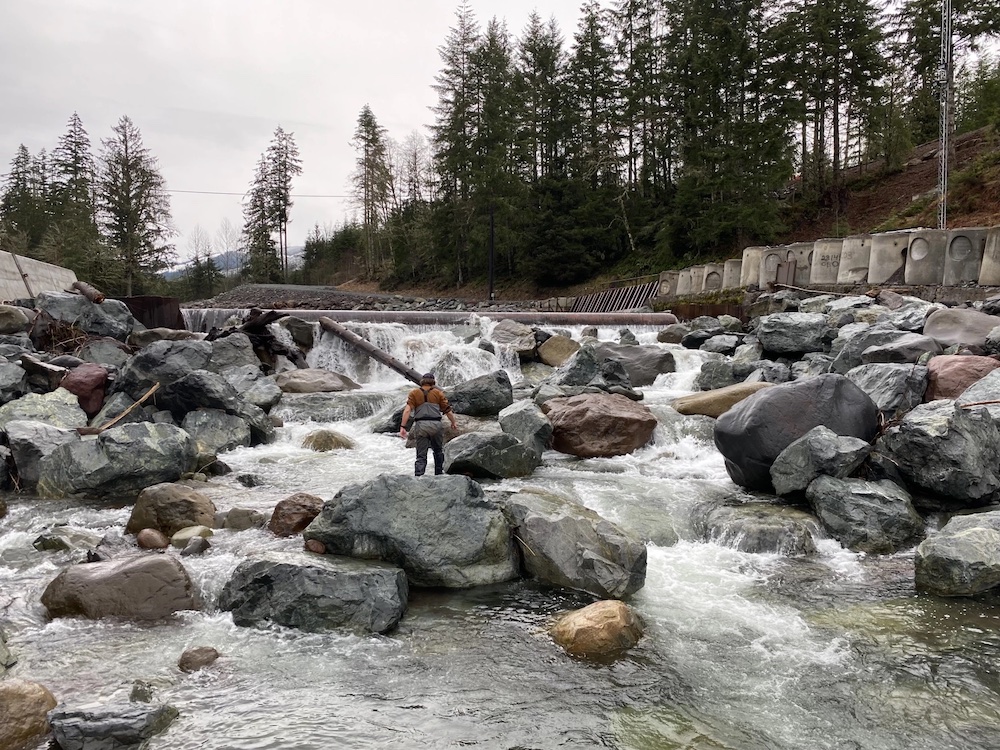
- Details
- By Kaili Berg
- Energy | Environment
A federal judge in Seattle has ordered the removal of a segment of Washington’s Electron Dam from the Puyallup River, marking a win for environmental preservation and the protection of endangered species. The ruling signifies a step toward restoring natural water flow along the river for the first time in nearly a century, environmental and legal advocates say.
The ruling by Judge John C. Coughenour in U.S. District Court for the Western District of Washington ordered Bellingham, Wash.-based Electron Hydro LLC to comply with a plan put forward by the Puyallup Tribe, which initiated the legal battle following the company's discharge of toxic tire rubber into the river and construction of a “temporary” rock dam and sheet pile wall in 2020.
The judge's order requires Electron Hydro to apply for necessary permits and remove a portion of the rock dam during the 2024 in-water work season to allow for upstream fish passage. The work must be completed by Sept. 15, 2024.
The court’s order deemed the structures in question posed an imminent threat to the survival of steelhead trout, Chinook salmon, and bull trout, species all listed as threatened under the Endangered Species Act.
The Puyallup Tribe, deeply intertwined with the river’s ecosystem and dependent on its health for cultural and subsistence practices, played a central role in the litigation. The Tribe’s suit highlighted the detrimental impact of the dam on fish populations and their historic migration patterns, critical for spawning and sustaining the river’s ecosystem.
In an emailed statement, the Puyallup Tribal Council emphasized the Tribe’s longstanding commitment to safeguarding the river’s ecological integrity,
“For years, Electron Hydro has followed its devastating act of polluting the water with turf with further harm to fish by preventing their upstream migration,” the Council wrote. “We are grateful the court agreed with our repeated calls for its removal because the dam violated the Endangered Species Act. The Tribe will work closely with agencies to be sure this happens as soon as possible. It is a good day for salmon, even if it took years to get to this result.”
The Puyallup River holds profound cultural and ecological significance for the Tribe, serving as a vital habitat for Chinook salmon, a species essential to both tribal and non-tribal fishers, and as a primary food source for endangered Southern Resident orcas.
Additionally, the river supports populations of steelhead and bull trout, both protected under the Endangered Species Act. The century-old dam, long recognized as a barrier to salmon migration, has consistently violated federal conservation laws.
“This is a monumental decision that will allow fish unimpeded access to pristine habitat above the dam for the first time in more than 100 years,” Elizabeth Forsyth, senior attorney with Earthjustice’s Biodiversity Defense Program, said in a statement. “The Endangered Species Act ensures that companies like Electron cannot blatantly harm or kill threatened and endangered species. We are thankful that the Court recognized these impacts and chose to at long last free the Puyallup River and the species that call it home.”
The legal battle against Electron Hydro has been fraught with challenges, including the company’s persistence in constructing the dam despite orders to halt operations. Following the discharge of the artificial turf into the river, Electron proceeded with the construction of the dam without obtaining full permits. Despite regulatory injunctions, the harmful structures remained in place for nearly four years, exacerbating the plight of protected fish species in the river, according to a statement.
Last year, a Pierce Country Superior Court ordered Electron Hydro and its chief operating officer, Thom Fischer, pay $1 million in fines after the discovery that the dam operator lined a river bed with astro-turf during a construction project. The penalty included $745,000 in restitution to the Puyallup Tribal Fisheries to restore the river.
This story originally appeared in our Native News Online publication and has been updated.
